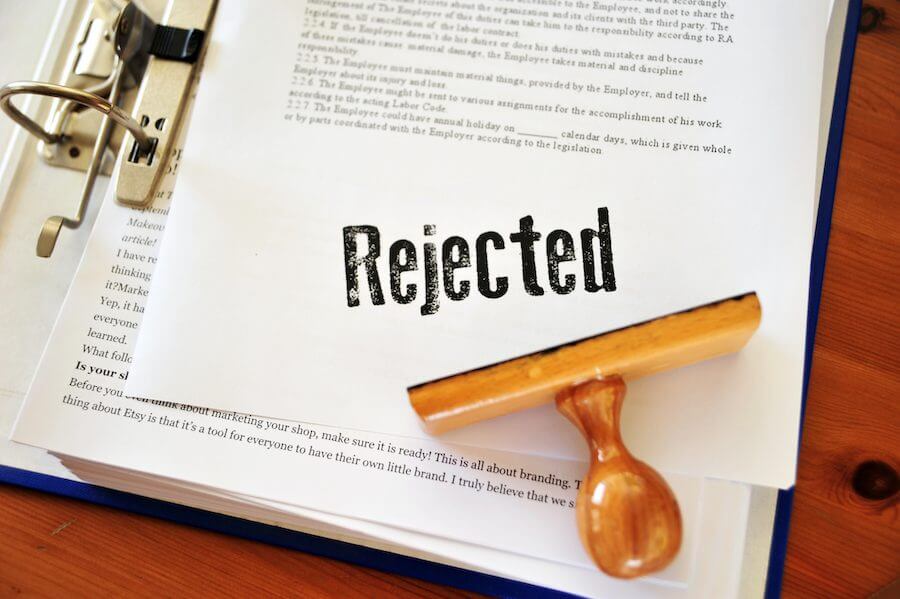Historically, in the majority of Westernized societies, men were the ones who had careers, while women were the ones who stayed at home and looked after the children. However, over the last decade, this patriarchal pattern has seen a change. Women are now focusing their goals more on other pursuits, such as their careers. There has also become increasing pressure on school leavers to gain a career rather than just a ‘job’, which has coincidentally led to a highly competitive job market. For one job, applicants are increasing, and interviews have become harder. And so, rejection is a natural consequence.
Naturally, it is the employer’s responsibility to let the unsuccessful candidate know that they have not made it past the interview stage, however many they have attended, whether face to face or on the phone, and aren’t chosen for the position. It is not a pleasant task and can be difficult to choose the right person, as most people these days have many qualifications, qualities, and impressive CVs. Yet it is a requirement for the employer to send a rejection email for two reasons.
Firstly, it is courteous and kind. It is surprising how often you hear of people at different stages of seeking employment (applying online, sending their CV, speaking on the phone with an employer, attending a face-to-face interview, or even a second-stage interview) and they don’t hear anything back. This can make them lose interest in the job or respect for the employer, therefore affecting the company’s reputation. But it can also unjustly affect the applicant’s confidence, no matter how strong a candidate might be.
Secondly, it’s helpful for the applicant to have feedback. People are unsuccessful for numerous reasons- the most common being a lack of experience, qualifications, and personality fit. If the applicant is aware of this, they can expand their skills and experience, reapply, or adjust their job search by applying for roles more suited to them. Additionally, it is occasionally the case that the applicant is suitable but just unsuccessful for other reasons.
EXAMPLE
The job might have been put on hold, in which case the employer might ask to keep their details and CV on file for future positions. The applicant might want a higher salary, or the commute might be too much, in which case the employer could negotiate with the applicant on such matters, and if not, at least the applicant knows it’s not their ability that stopped them. Sometimes, however, the applicant’s performance in the interview is not up to scratch, so it is the employer’s responsibility to let the applicant know their feedback, no matter how negative. Overall, this means the employer is not waiting aimlessly and can continue applying for jobs, bringing that feedback to their next interview.
Free Post-interview Rejection Templates
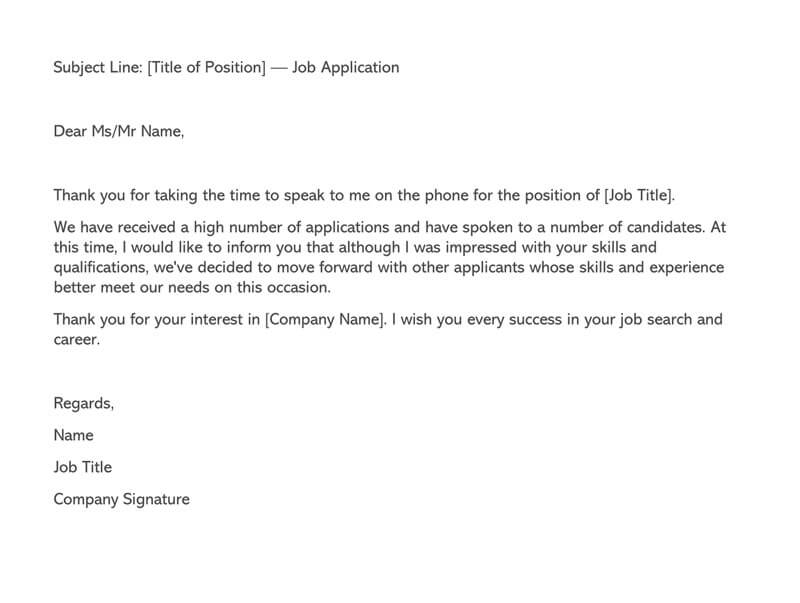
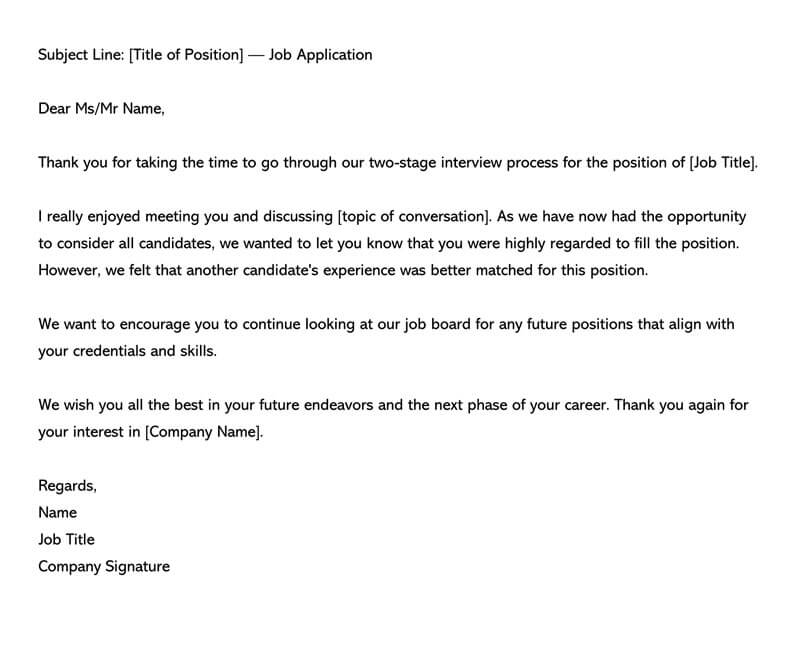
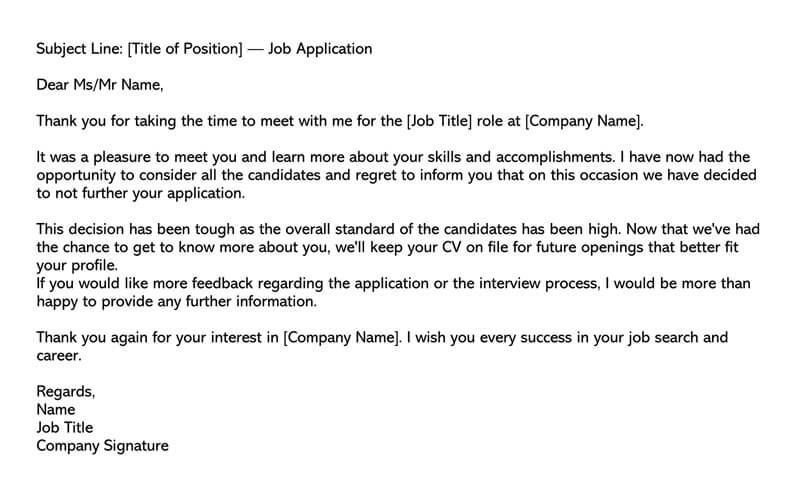
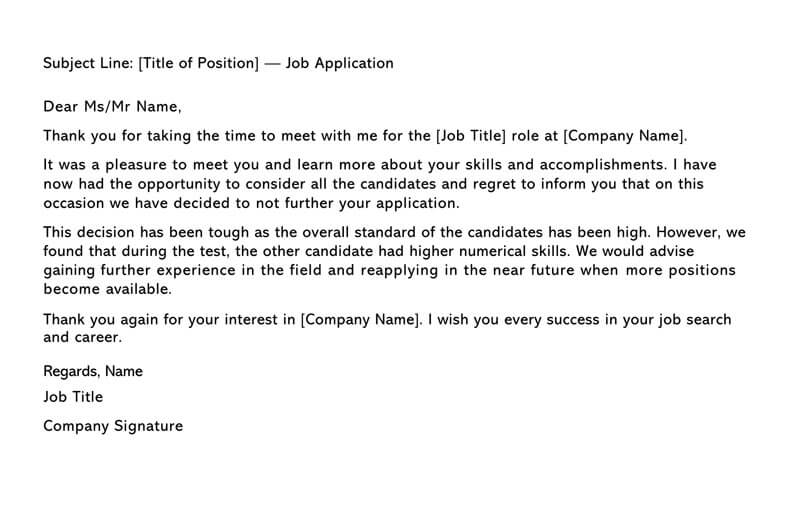
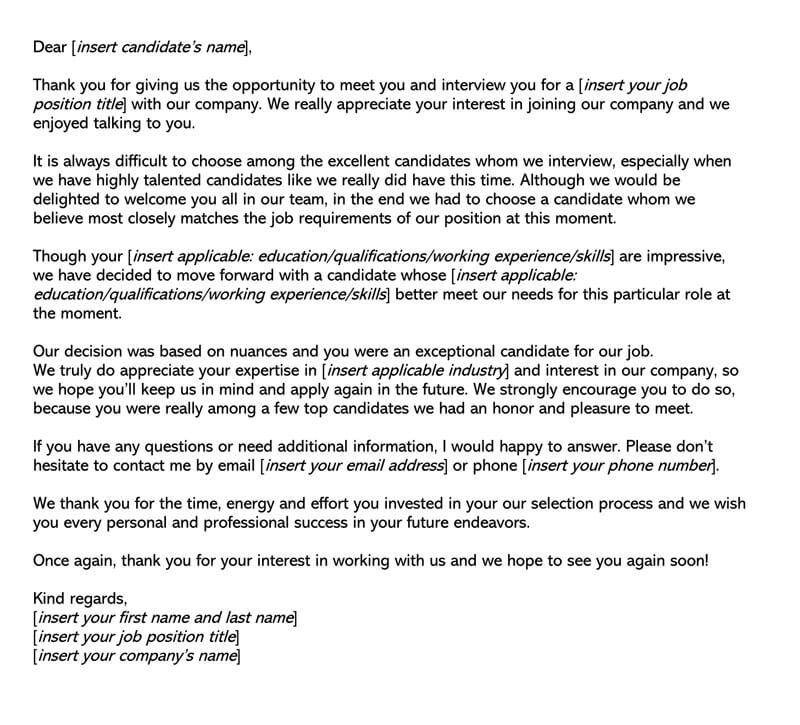
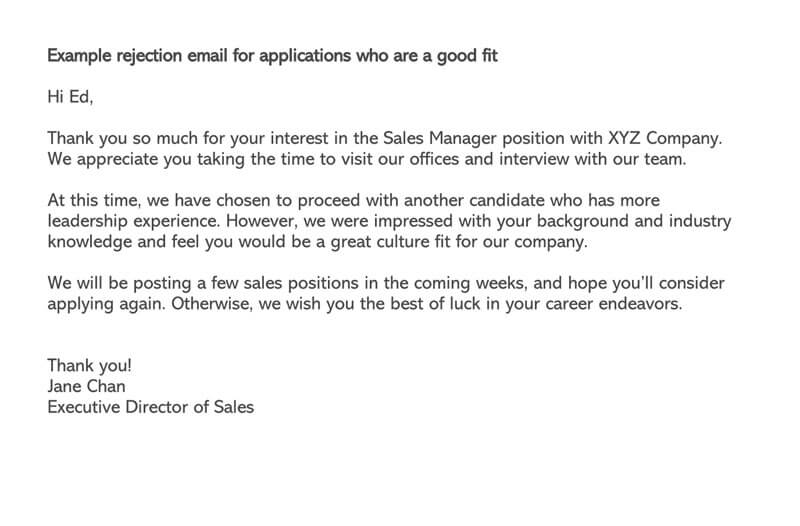
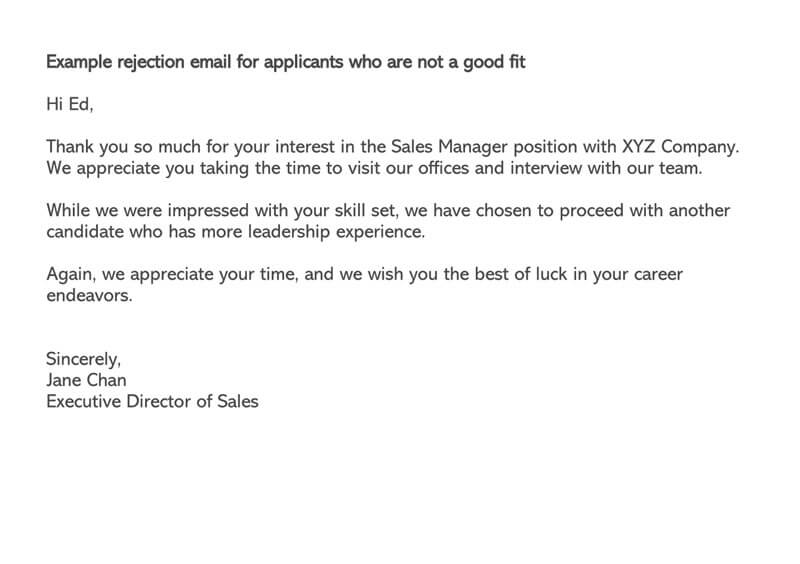
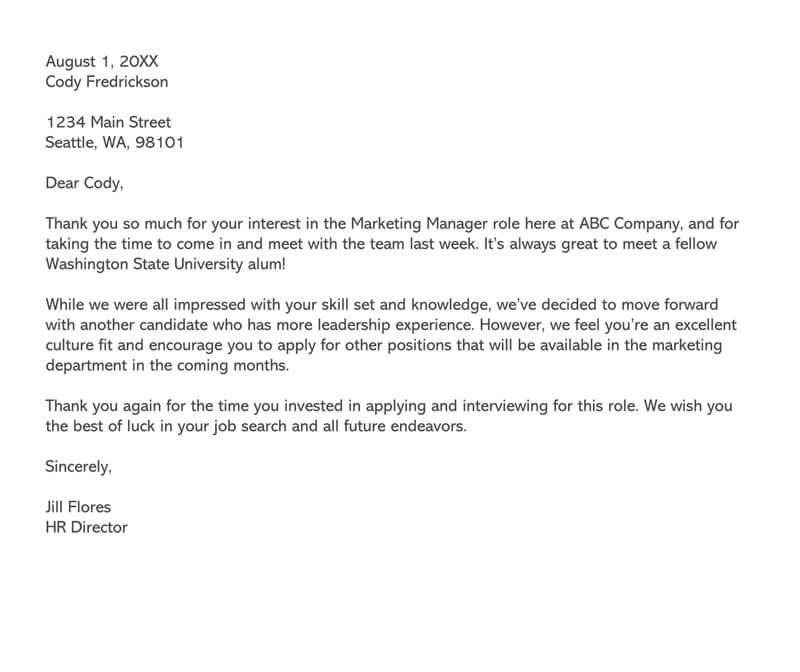
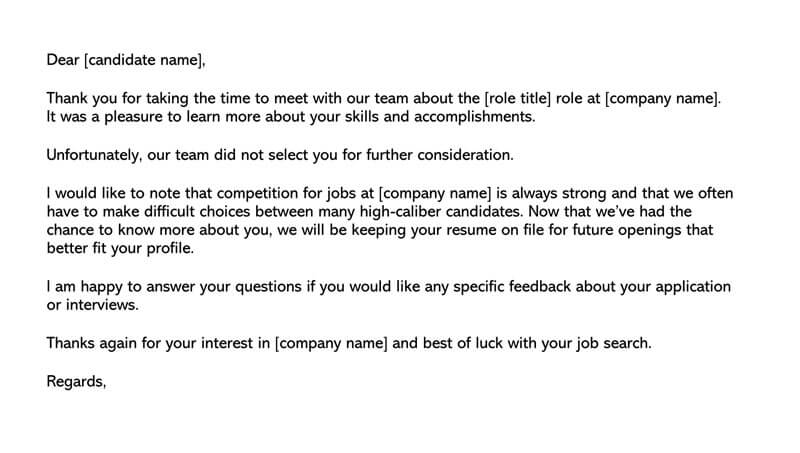
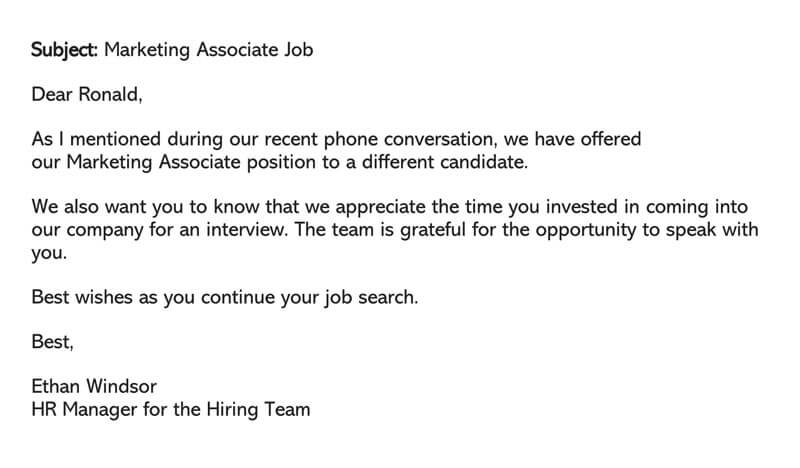
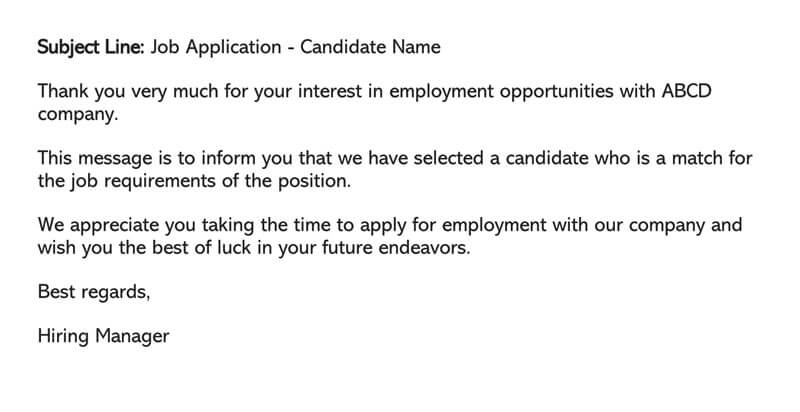
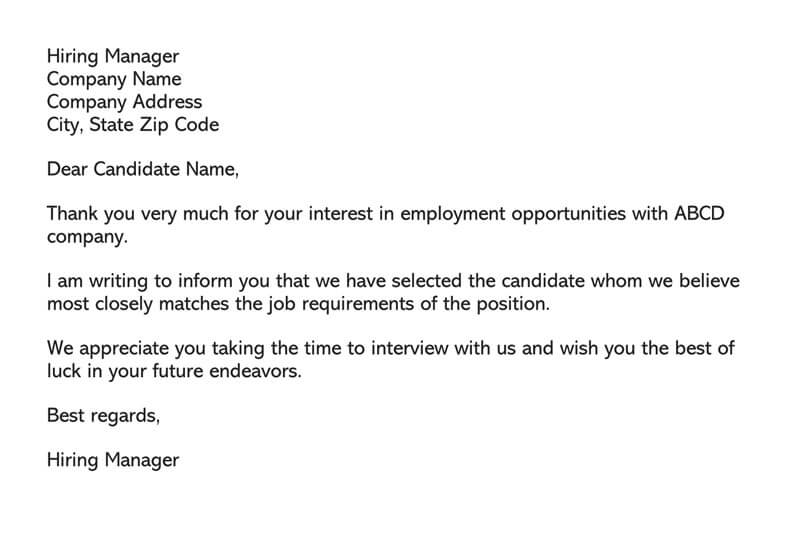
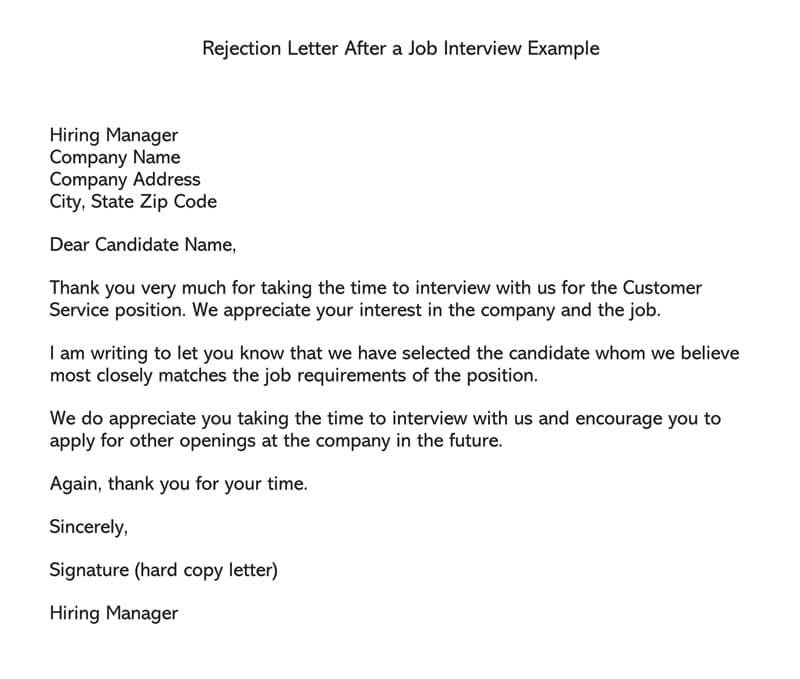
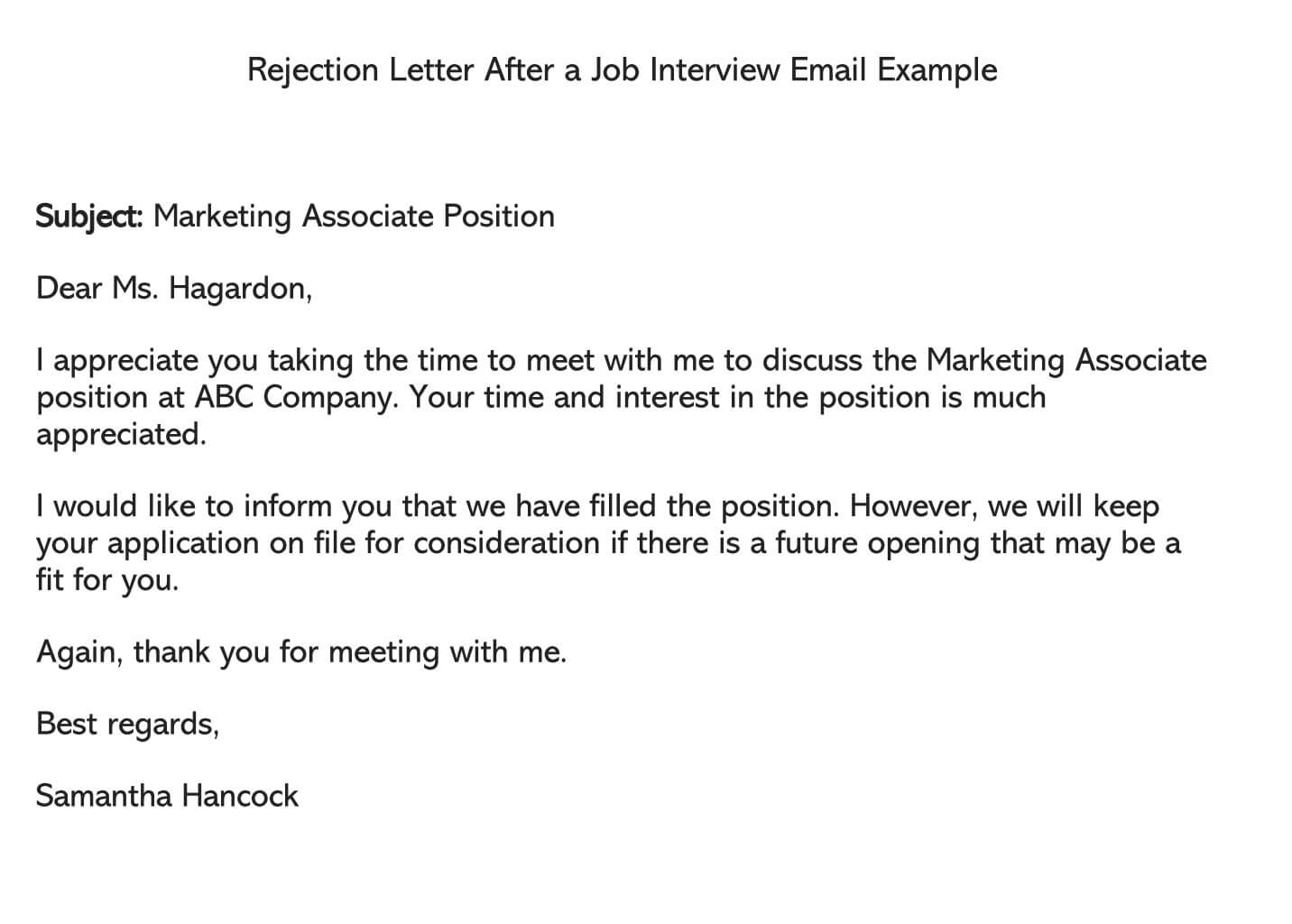
The Benefits of Sending a Rejection Email
Sending a rejection email to rejected candidates is beneficial to the business in a variety of ways, including:
- Aids in maintaining a good relationship: When sending a rejection email to a candidate, it will provide a good relationship with the candidate in case their talents are required in a different position or if their talents might prove valuable in the future.
- Helps in improving the business’s reputation: A business that has a good reputation is more likely to flourish. The reputation will bring more skilled and capable candidates for future job openings.
- Shows professionalism: Sending emails that give clear reasons as to why the candidate was not chosen and thanking them for their time is much more professional as opposed to simply ignoring the other candidates when the job position is filled. This also shows that the business has a good HR department, which is always desired among employees and those who seek to work for the business.
- Keep the rejected candidates as customers: Having a good impression of the candidates is essential to keeping them as loyal customers. How these candidates feel about the business after the interview will determine whether they want to support the business or cut off any relations with it.
How to Write a Rejection Email
When writing a rejection email, it should be concise, customized to the candidate, and in formal language.
The email must include four components:
Mention the name and position of the applicant
Mentioning the name of the applicant will show that the email was made specifically for the candidate, unlike an automated email. Mentioning the position that the candidate was rejected for is essential as well.
EXAMPLE
“Dear Jack Robertson
We regret to inform you that you are not eligible for the job as an assistant manager.”
Appreciation for trying
Thanking the candidate for taking the time to apply for the job and getting to the interview. This will aid in improving relations with the candidate and maintaining rapport.
EXAMPLE
“Thank you for applying to our job openings.” “We appreciate the time and effort you put into applying for our job opening.”
Give feedback to the candidate
Mention why the candidate was rejected and mention the ways the candidate can improve themselves. Note that rejecting them based on age, gender, nationality, marital status, disability, or religion can be considered discriminatory. Thus, sometimes it is legally safer for the business to not state why the candidate was rejected.
EXAMPLE
“For our position as lead writer, we require someone with at least a Master’s degree in English.”
or,
“A three-year experience in the field is what we are looking for in our employees.”
Invite the candidate to apply again
Suggest that the candidate improve their set of skills and apply again for the job position. Having a good collection of talents and candidates to fall back on will make the future hiring process faster and easier.
EXAMPLE
“Kindly consider applying again if you get a Master’s degree as we would like to work with you” or “Please consider applying for our other job openings, such as a graphic designer. We think you would be perfect for that job.”
Rejection Email Template
Subject: Update on Your Job Application – [Position Title]
Dear [Candidate’s Name],
I hope this email finds you well. I wanted to take a moment to express my gratitude for your interest in the [Position Title] role at [Company Name] and for taking the time to interview with us.
After careful consideration and review of all candidates, we regret to inform you that we have decided not to move forward with your application at this time. Please know that this decision was not easy, as we genuinely appreciate the effort and enthusiasm you demonstrated throughout the interview process.
We want to assure you that your qualifications and experience were thoroughly assessed during the interview process. However, we ultimately determined that another candidate’s skills and background more closely aligned with the specific needs of the role and our team.
We understand that receiving this news may be disappointing, and we want to assure you that your application was given fair and thoughtful consideration. Your interest in joining [Company Name] is genuinely appreciated, and we encourage you to continue pursuing opportunities that match your skills and career goals.
While we are not moving forward with your application for this particular role, we will keep your resume on file for future opportunities that may arise and could be a better fit for your profile.
Once again, thank you for considering [Company Name] as a potential employer. We wish you all the best in your job search and future endeavors.
Sincerely,
[Your Name]
[Your Job Title]
[Company Name]
[Contact Information]
Sample Rejection Emails After Interview
Subject: Update on Your Application for the Marketing Manager Position
Dear Emily Thompson,
I hope this email finds you well. Firstly, I would like to extend my sincere gratitude for your interest in the Marketing Manager position at Vision Marketing Solutions and for investing your time and effort in the interview process with us.
After careful consideration and thorough review of all candidates, I regret to inform you that we have decided not to move forward with your application for the Marketing Manager position at this time. While this decision was certainly not easy, please know that it was made after extensive evaluation and deliberation.
We were impressed by your experience, skills, and enthusiasm for the role, and we appreciate the insights and perspectives you shared during the interview process. However, after careful consideration of our team’s current needs and the qualifications of all candidates, we have chosen to pursue other candidates whose profiles more closely align with our specific requirements for this position.
I want to emphasize that this decision does not reflect any shortcomings on your part. We received many strong applications, and the selection process was highly competitive. Your qualifications and experience are valuable, and we encourage you to continue pursuing opportunities that align with your career goals and aspirations.
Although we are not moving forward with your application for the Marketing Manager role at this time, we would like to keep your resume on file for future opportunities that may arise within our company. Your skills and experience may be a better fit for other roles in the future, and we would welcome the opportunity to consider you for those positions.
Once again, thank you for your interest in joining the Vision Marketing Solutions team. We appreciate the time and effort you dedicated to the application and interview process. We wish you all the best in your job search and future endeavors.
If you have any questions or would like feedback on your interview, please feel free to reach out to me directly at [john.smith@visionmarketingsolutions.com] or [555-123-4567].
Warm regards,
John Smith
HR Manager
Vision Marketing Solutions
john.smith@visionmarketingsolutions.com
555-123-4567
Analysis
This rejection letter effectively conveys appreciation for the applicant’s interest and effort, maintaining a respectful and empathetic tone throughout. It demonstrates transparency by briefly explaining the decision-making process and reassures the applicant that their qualifications were duly acknowledged. The offer to keep the applicant’s resume on file for future opportunities shows openness to potential collaboration down the line, maintaining a positive relationship. Moreover, the invitation for feedback reflects a commitment to candidate engagement and professional growth. Overall, the letter balances professionalism with empathy, leaving the applicant with a sense of dignity and encouragement despite the outcome.
More Templates
Below are customizable templates that can be downloaded for free and can be used as per need:

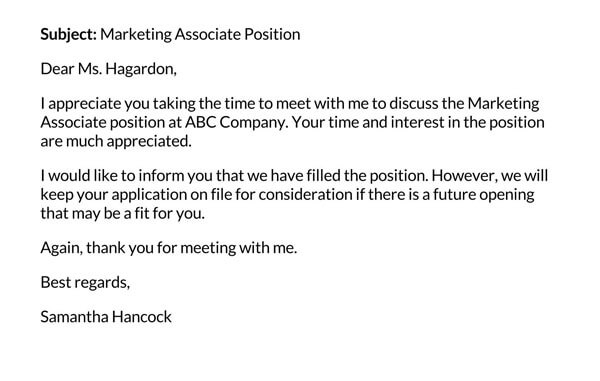
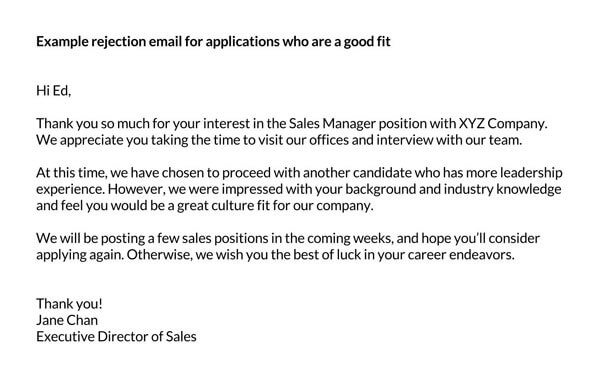
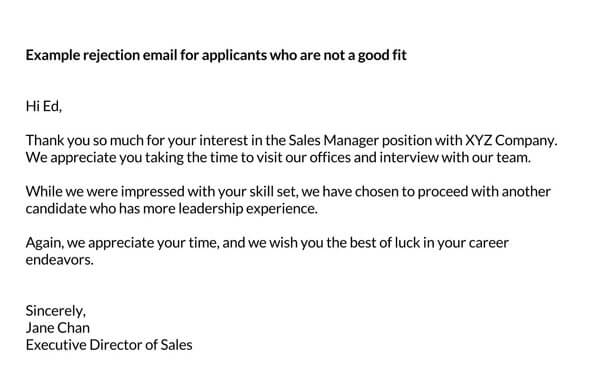
Quick Tips for Writing Rejection Letter
Following are a few quick tips to make the rejection letter look more professional:
- Address the applicant formally, including titles, e.g., ‘Dear Mr. Robert Jones’, or if they have another professional title, e.g., ‘Dear Dr. Robert Jones’.
- Mention at least two positives about their applicant, e.g. ‘you listed some great qualifications on your CV’ or ‘you had been in your current role for a number of years’ (showing their loyalty.) If they attended an interview, you can mention their performance, e.g., ‘you came across as a good cultural fit’ or ‘you answered the questions very well.
- Say you enjoyed meeting with them and wish them luck in the future.
- Ensure you proofread your letter/ email and get a company lawyer to check over it.
Conclusion
A rejection email is important for keeping relations with the candidates, helping with future job hiring, and maintaining a good employer reputation. The email needs to be brief, formal, and made especially for each candidate while giving feedback to the candidate for the cause of rejection and showing appreciation for their time.

